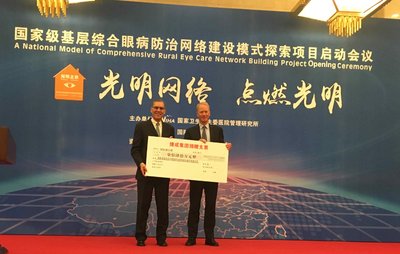BEIJING, Oct. 31, 2016 /PRNewswire/ -- Since launching Project Morning Star in 2011, and witnessing many great achievements over the past five years, Jebsen Group (Jebsen) will continue its partnership with ORBIS International for the next five years as Phase 2 of the project.

Responding to the Chinese Government's call to accelerate health development in China, Jebsen plans to invest RMB 7.4 million from 2016 to 2020. The funds will be used to build China's first "National Model of Comprehensive Rural Eye Care Network", initiated by the National Institute of Hospital Administration (NIHA), in collaboration with the internationally-recognised NGO, ORBIS International (ORBIS).
The project will focus on the grassroots level, selecting six typical, county-level hospitals for the pilot, ultimately aiming to improve the ophthalmic capabilities of thousands of the country's county-level hospitals, and establish a new, sustainable development model for building eye care hospitals in rural areas. More than one million people are expected to benefit from the project by 2020.
Project Background and social context
In recent years, China has made significant progress in preventing blindness, but still faces great challenges. According to the 2014 Chinese Adult Eye Epidemiology Survey, the number of people who are blind or suffer from moderate to severe visual impairment in China is as high as 20 million. Uncorrected ametropia and un-operated cataracts are the main causes of visual impairment.
This new project will focus on grassroots medical institutions through comprehensive technical training and practice, improvements in ophthalmic service capabilities, strengthening of county, township and village cooperation, and the establishment of a high-performance eye care network. As a result, local people will enjoy better eye screening and treatment services.
Through hospital personnel management and team training, hospitals will improve their ability to support the establishment of the team and its management system. Through the construction of "Vision Center" and an eye care network in rural areas, there will be a local capability for screening, referring and educating patients. Patient volume and surgery rates will increase and, ultimately, in county hospitals, there will be sufficient medical coverage to achieve the early detection and treatment of eye diseases. The economic benefits of these hospitals will enable the sustainable development of this eye care network.
Details of project impact
From 2016, the project will select six county hospitals with different levels of economic development in Eastern, Central and Western China as pilot sites, and plan to provide 20,000 cataracts patients with the medical care they required. Of these, 600 impoverished patients will receive surgical assistance; 120,000 pairs of glasses will be delivered to patients in need; 600,000 local residents will receive free eye screening; 1,000,000 local residents will receive eye care education.
By 2020, it is expected that ophthalmology treatment at county-level hospitals will be comprehensively improved, patient volume and operation rates will double, and a sustainable, profitable model will be realised. The "Vision Center" will replace the current lack of eye care resources in rural areas, providing basic ophthalmic services for residents, such as screening and education, and taking responsibility for patient referrals. Deeper ophthalmic services will offer a steady flow of patients to county-level hospitals, thus achieving a sustainable eye care network system. As many as 3.5 million people, covered by 6 county-level hospitals, will be able to receive early detection and treatment in time to avoid preventable blindness.
During the project, ORBIS, together with NIHA will promote the model that will successfully build these six pilot hospitals into thousands of others nationwide. This will include continued, organised visits and study by other county hospital representatives, publishing articles in domestic and international academic journals, and promotion within the industry and health system. It is hoped that by the end of the project, more county hospitals will recognise and replicate the model, so that many more grassroots rural residents across the country, who currently cannot enjoy ophthalmic services, may benefit.
Jebsen's Investment and CSR commitment
Over the next five years of Project Morning Star Phase 2, Jebsen Group will commit to a RMB 7.4 million donation for constructing China's first "National Model of Comprehensive Rural Eye Care Network." As a donation partner, Jebsen will also support ORBIS and co-branded activities in Hong Kong. In addition, employee participation will continue to be emphasised including volunteer visits to Project Morning Star's sites.
"With the tremendous results and impact of Project Morning Star's first five-year phase, Jebsen Group hopes to deepen the impact of the sight-saving mission, together with ORBIS, to benefit even more eye patients, and for them to lead to healthier and more fulfilling lives," said Mr Helmuth Hennig, Group Managing Director of Jebsen Group.
With its core purpose set as "to enrich people's lives by providing a choice of quality products and services", Jebsen Group has always been committed to helping the community and local residents where it operates, as a focus of its corporate social responsibility (CSR). The partnerships between the government, NGO and corporation, realised through the five-year extension of Project Morning Star, to build a comprehensive eye care network, will become another benchmark for Jebsen CSR programmes in achieving a sustainable impact in China.
About Jebsen Group
Founded in 1895, Jebsen Group is a focused marketing and distribution organisation. With a long, unique established presence and deep understanding of Mainland China, Hong Kong, Macau and Taiwan, the Jebsen Group is committed to supporting our partners' needs in building market demand, generating and supporting sales, and serving as an important link to customers throughout the region. With a broad spectrum of consumer, beverage, industrial, and motors products, Jebsen offers some 200 of the world's leading products extensive local market access with a high degree of specialisation. Outside the region, the Jebsen Group enjoys close ties with sister companies in Australia, South East Asia, Denmark, Germany, Middle East and the United States. For more information, visit www.jebsen.com and Jebsen Facebook page (facebook.com/jebsengroup), or follow us on Sina Weibo (weibo.com/jebsengroup), WeChat (id:jebsen1895) and LinkedIn (id:jebsen group).